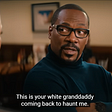Film Review — Father Stu
Mark Wahlberg impresses in an uneven but engaging biopic of Father Stuart Long.
There have been a lot of sneering reviews of this fact-based, faith-positive tale of Father Stuart Long. Frankly, much of this appears to be prejudice concerning the Christian subject matter, and an ungenerous attitude towards the casting of Mel Gibson, about which more in a moment. What is fair to say is that the film is uneven in tone and arguably a little preachy in some of the latter sections. However, I still found it absorbing throughout, with a strong, committed central performance from Mark Wahlberg. This is clearly a passion project for Wahlberg, as he’s also a producer, alongside first-time writer-director Rosalind Ross.
In 1994, Stuart Long (Wahlberg), an amateur boxer from Montana, is warned to give up the sport by doctors. Frustrated and uncertain as to his direction in life, he heads to Hollywood attempting to become an actor. After chatting up strict Catholic Carmen (Teresa Ruiz), he decides to convert on her account. Subsequently, a religious experience following a motorbike crash leads him to the priesthood, only for a debilitating muscular disease to complicate his newfound commitment to God.
Despite the structural flaws, what makes Father Stu work for me are the performances. Wahlberg is excellent as a determined man who has suffered at the hands of an abusive, alcoholic father (Mel Gibson) that poured cold water on all his childhood dreams. Stuart’s warts-and-all journey to faith — with plenty of plausible missteps along the way — is the beating heart of the film, and it is worth seeing purely for this reason.
At first glance, we’re as sceptical as Monsignor Kelly (Malcolm McDowell) at the unorthodox, foul-mouthed Stu’s chances of making it in the priesthood. But the film does a good job of showing the genuine change in his life. His unconventional approach and clear-headed understanding of Jesus’s life, teaching, and sacrifice frequently prove his detractors wrong. His relationships with fellow trainee priests Ham (Aaron Moten) and Jacob (Cody Fern) — supportive and dubious respectively — are well-handled. One scene when Stu accompanies the latter during a prison visit is particularly telling, as the out-of-his-depth Jacob is ridiculed, only for Stu to step in by speaking to the prisoners in a way they can respect. Incidentally, Fern’s performance is particularly moving, especially in a confession scene late in the film.
Equally good is Jacki Weaver as Stu’s mother, and the aforementioned Mel Gibson. The casting of the latter proved controversial for some, who feel Gibson’s role is too close to the bone, given real-life events in his past. Whilst I understand to a point, I still think his performance was excellent, and we should separate art from artist. For those who can’t, yes, the role has baggage, but by all accounts, Gibson is a repentant man. Perhaps his involvement constitutes a form of penance, or a self-aware acknowledgement of his failings, especially considering the redemptive nature of the story. Either way, in my opinion, and without condoning any of his past behaviour, Gibson deserves credit for his performance.
I do acknowledge that the film gets a little preachy in a couple of areas, but to my mind, this is largely offset by Wahlberg’s honest performance. There’s nothing fake about his character, and whilst believers will find this story faith-affirming, to my mind, it is still a film all audiences will engage with. Father Stu has its heart in the right place, both as an examination of faith in the face of suffering and adversity, and as an inspiring story regardless of the religious beliefs (or otherwise) of the viewer.
This article was originally published at Simon Dillon Books. For more about me and my writing on Medium, please click here. For a list of my published novels and other works, please click here.



